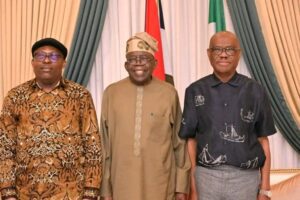FCT Minister answerable to President alone, N’Assembly — Falana, Adegboruwa

Senior Advocates of Nigeria, Femi Falana and Ebun-Olu Adegboruwa, have waded into the dispute between the Minister of the Federal Capital Territory, Nyesom Wike, and the Senator representing the FCT, Ireti Kingibe.
The senior lawyers noted that the FCT minister in terms of execution of duties was not answerable to Kingibe or the National Assembly.
The FCT lawmaker had warned Wike to desist from working without the supervision of the National Assembly. Kingibe also noted that the FCT minister does not have executive powers but must operate within the constitutional frameworks of the country’s legislative arm.
Kingibe said, “You also have to remember that the minister of the FCT – I’m not sure we have had a former governor as a minister, I think we have had one. Some [former] governors may think that as an FCT minister, the minister does not have executive powers. He works hand-in-hand with the National Assembly and the president to administer the FCT.”
However, interpreting the constitution, Falana stated that Kingibe was wrong to have said that the minister was answerable to the National Assembly in the discharge of his duties.
He said, “The distinguished senator is wrong. The power of the executive with respect to the FCT lies with the President. Making laws and passing laws for the FCT are the business of the National Assembly.
“Section 299(a) of the constitution provides: The provisions of this constitution shall apply to the Federal Capital Territory, Abuja as if it were one of the states of the Federation; and accordingly
“(a) all the legislative powers, the executive powers and the judicial powers vested in the House of Assembly, the governor of a state and in the courts of a state shall, respectively, vest in the National Assembly, the President of the Federation and in the courts which by virtue of the foregoing provisions are courts established for the Federal Capital Territory, Abuja.”
He further explained that since the executive powers of the FCT are vested in the President who then delegates them to the minister as he pleases, the minister can act in the capacity of the President who is the governor of the FCT.
Falana said, “The executive powers of the FCT are vested in the President, the legislative powers are vested in the National Assembly, while the judicial powers are vested in the High Court of the Federal Capital Territory.
“To that extent, it is very wrong to say that since there is no governor in the FCT, the executive powers are vested in the National Assembly; those powers are vested in the President.
“So, whenever the president appoints a minister, the minister is performing in the powers delegated to him or her by the President.”
He added, “If you are dissatisfied with the decision taken by anyone in the FCT, you go to the FCT High Court.”
Corroborating his colleague, Adegboruwa said that the minister was answerable to the President and not the National Assembly as posited by Kingibe.
The SAN explained, “The ministers are all appointed by the President, and they owe their duties solely to the President who has the power to remove them or have their decisions overturned.
“Among the ministers, only the Attorney General has specific responsibilities that are recognized by law as stated in Section 174 of the 1999 Constitution.”
Adegboruwa further explained, “The rest of the ministers have no specific statutory duties unless assigned to them by the President.
“So, to that extent, the ministers of the FCT, like other ministers, report to the President for his day-to-day activities. He is not responsible to the National Assembly or members of the legislature except with respect to defending the expenditure or budgeted estimate or whenever he is summoned to appear before the National Assembly when they are carrying out their oversight functions or they are passing a law that requires some investigations or contributions.”
The senior lawyer further clarified that other than that, the minister is not answerable to the National Assembly for his day-to-day execution of functions as long as it aligns constitutionally and it’s in line with the mandate of the President that appointed him.
He added, “As it pertains to the FCT generally, I think that it is important to recognize that it is a no man’s land by the law of our land, although the constitution also recognizes the natives and the indigenous people.
Credit: Punch




